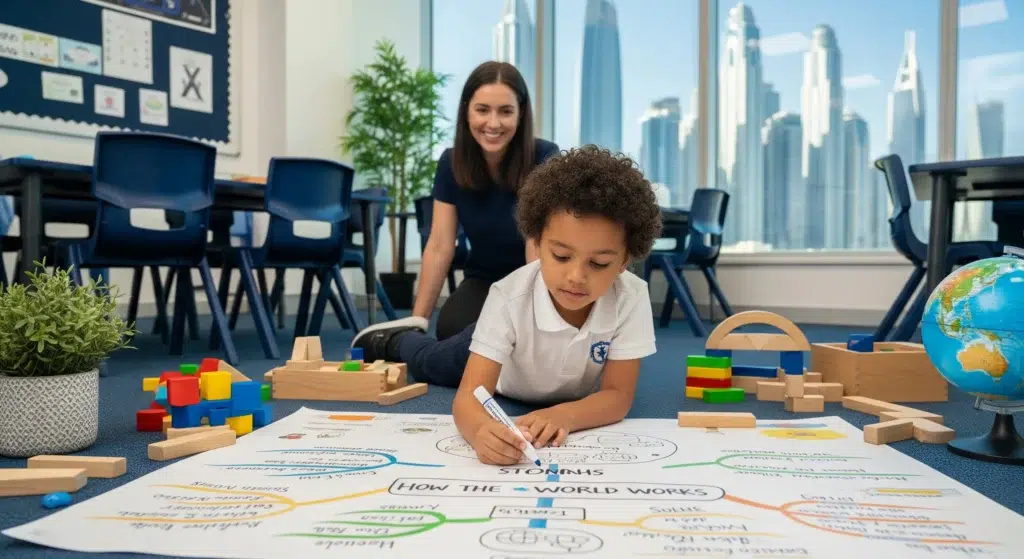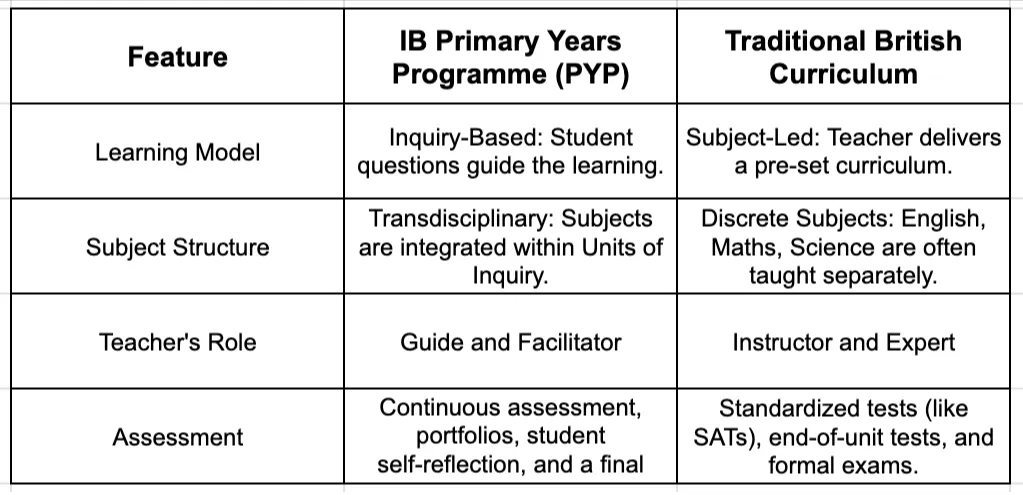Navigating the IB Primary Years Programme (PYP) in Dubai Schools
If your child is enrolled in an IB school in Dubai, you’ve likely heard a unique vocabulary used to describe their education. Phrases like “inquiry-based,” “Units of Inquiry,” and the “Learner Profile” are central to the Primary Years Programme (PYP), but they can often leave parents wondering: what does it all actually mean? And how is it different from the way I was taught in school?

The IB PYP is a world-renowned educational framework, celebrated for its focus on developing curious, well-rounded, and independent thinkers. However, its student-led approach can seem mysterious compared to traditional, teacher-led curricula.
This guide is here to demystify the PYP. We’ll break down the core philosophy, explain the key terminology in simple terms, and show you how this innovative approach is preparing your child for a future of lifelong learning.
The Heart of the PYP: What is Inquiry-Based Learning?
The single biggest difference between the PYP and a traditional curriculum is the shift from being told information to actively discovering it. This is called inquiry-based learning.
Analogy: Imagine you want to teach a child about boats.
Traditional Approach: You would give them a book with chapters on “Types of Boats,” “Parts of a Boat,” and “History of Boats.” You would ask them to memorize the facts and then test them on their recall.
Inquiry-Based Approach (PYP): You would start with a big question: “How do we explore and travel across water?” This question might lead the children to design their own boats, test which materials float, research historical sea voyages, and even explore the environmental impact of shipping.
In the PYP, the teacher’s role is not to be the “sage on the stage” who has all the answers, but the “guide on the side” who facilitates the students’ own process of discovery. Children are encouraged to ask questions, follow their curiosity, and make connections between different subjects.
The Core Components of the PYP Framework
The PYP is built around a few key elements that work together to create a holistic educational experience.
1. The IB Learner Profile
This is the heart and soul of the entire IB programme. The goal is to develop ten key attributes in students. You will hear these words often!
Inquirers
Knowledgeable
Thinkers
Communicators
Principled
Open-minded
Caring
Risk-takers
Balanced
Reflective
The aim is to develop not just a great student, but a great person.
2. The Six Transdisciplinary Themes
Instead of studying subjects in isolation (a maths lesson, then a science lesson), the PYP connects learning through six broad themes that transcend any single subject. These are:
Who we are
Where we are in place and time
How we express ourselves
How the world works
How we organize ourselves
Sharing the planet
3. The Units of Inquiry (UOI)
This is where the magic happens. For each of the six themes, students will explore a central idea in-depth for several weeks. This is their Unit of Inquiry. Within one UOI about “How the world works,” students might be conducting science experiments, writing reports, using maths to analyze data, and reading stories related to the central idea. Subjects are not ignored; they are woven together in a meaningful context.
Because the PYP is student-led, the specific direction a UOI takes can vary. While this fosters incredible independence, it can sometimes mean that a child who misses a key foundational skill (like multiplication or sentence structure) may not have it formally revisited. This is where personalized support from a primary school tutor in Dubai who understands the PYP can be invaluable, ensuring these core skills are rock-solid.
How PYP Differs from a Traditional Curriculum: A Quick Comparison

Complementing the PYP Journey
The PYP does an exceptional job of developing critical thinking and a love for learning. However, its less-structured nature means that some children can benefit from additional support to consolidate their core literacy and numeracy skills. A tutor’s role within the PYP framework is not to re-teach the UOI, but to act as a partner in building those foundational skills. Whether it’s mastering phonics, practicing times tables, or developing clear writing skills, this support ensures your child has the tools they need to fully engage with their inquiries. Many parents find that having a dedicated primary English or maths tutor provides the perfect balance to the PYP’s broad, conceptual approach.
Conclusion: Preparing for the Future
The IB Primary Years Programme is a unique and powerful framework that prepares children for the complexities of the modern world. It teaches them how to learn, how to ask questions, and how to make connections. By understanding its core philosophy and unique vocabulary, you can better support your child’s journey and celebrate their growth as a curious, confident, and lifelong learner.
If you feel your child could benefit from personalized support to strengthen their foundational skills within the PYP, learn more about how our expert primary tutors can help.